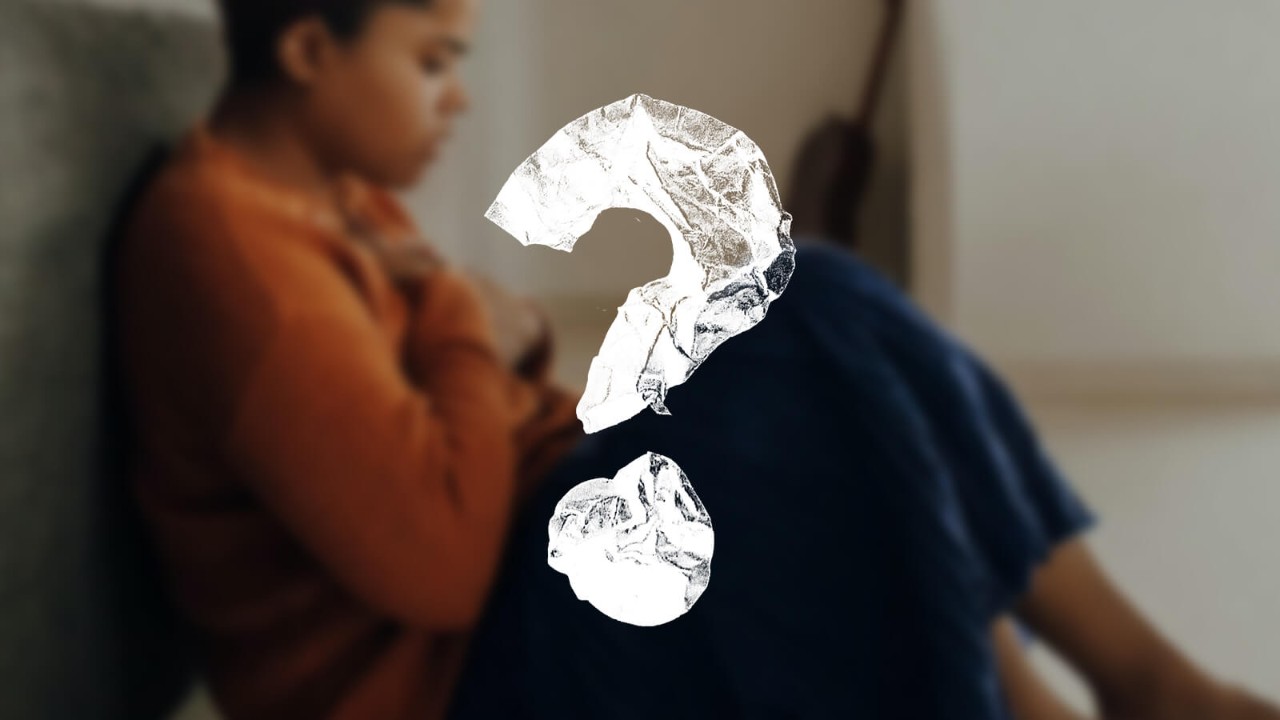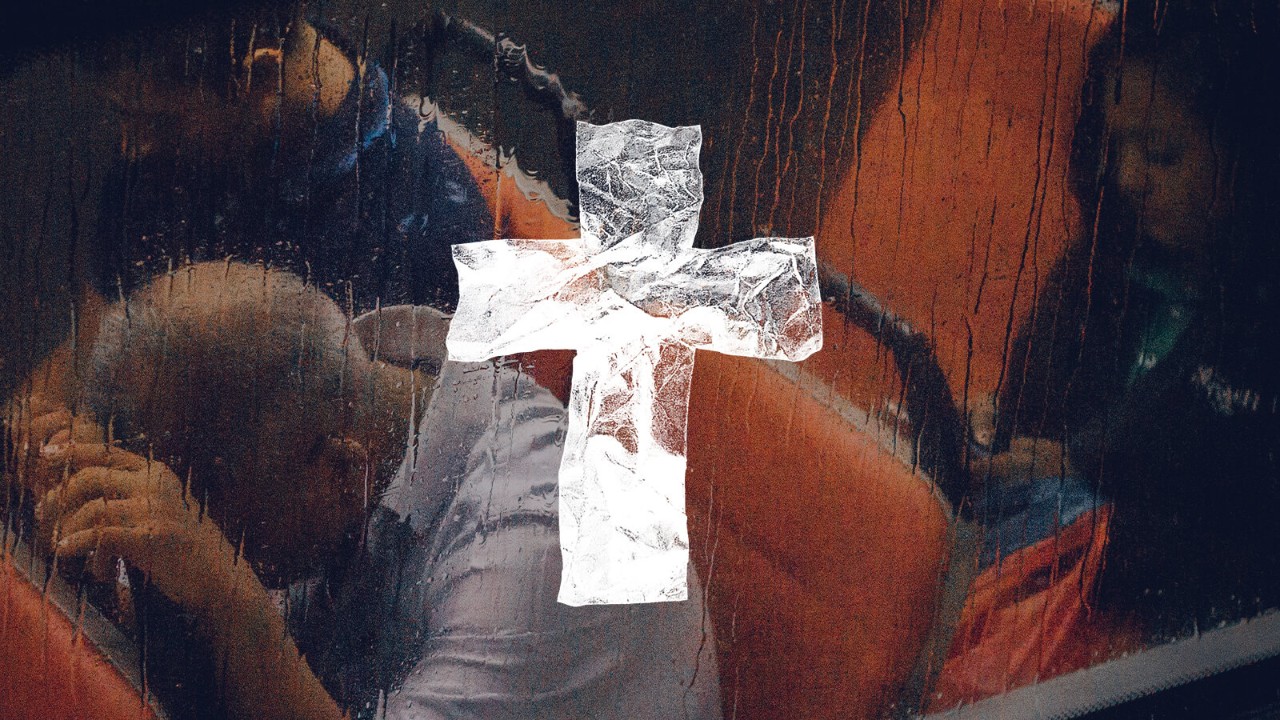
“How can God be good when there is so much suffering in the world?”
This is a valid question. Christians believe that God is completely good and in ultimate control of our lives. How do we reconcile that idea with all the pain and suffering we see and experience?
There are answers to these questions, but not surprisingly, they can feel complex. Some experiences of suffering are on an individual, family or community level. Others are on a much larger scale.
There are many factors to consider, but the bottom line is: The Bible shows us that suffering actually points to (rather than disproves) the existence of a good God who cares about people.
The Bible shows us very clearly that God is good and ultimately does not want people to suffer, but that suffering is nevertheless a reality in this life. To understand how this can be true, we’ll look at the overall story of God’s relationship with people in the Bible and where we are in that story now.
So if suffering is part of your reality right now, hopefully you will find fresh hope as you see God’s plan to end suffering once and for all.
If you already know which aspect of this topic you want to explore, the links below might help you get straight to what you’re looking for:

Though some people may seem to have things easier than others, everyone experiences suffering of one kind or another. For some, that’s poor physical health or the death of loved ones. For others, it’s economic hardship or political oppression. It’s hard to even imagine turning on the news without hearing about something terrible that has happened.
There are seemingly endless sources of suffering when you look around. Every day, there is war, murder, rape and persecution happening all over the world. Sometimes, we only see the suffering from a distance. When it strikes closer to home, suffering can change your perspective. When you or someone you love has been a victim of a crime, for instance, it can change the way you look at people around you and your feelings of general security.
Sadly, even good things can turn into sources of suffering. Relationships can bring us some of the greatest joy possible in this life, but they can also cause deep, lasting wounds. One of the most terrible experiences in this life is the death of a loved one. Being betrayed by a friend or having a partner end your romantic relationship are sources of heartache that can have a lasting effect on future relationships.
It makes sense in light of all the suffering in the world that people would ask why a good God is not stepping in to change things. After all, if God has power over everything, why does He not use it to end everyone’s suffering?
The question of suffering initially prevented the author and Oxford scholar C.S. Lewis from believing in God. But he eventually realized his desire for good and justice actually pointed to the existence of a good and just God.
In “Mere Christianity,” he explains, “My argument against God was that the universe seemed so cruel and unjust. But how had I got this idea of just and unjust? A man does not call a line crooked unless he has some idea of a straight line. What was I comparing this universe with when I called it unjust?”
Our desire to end suffering is a glimpse of the good God who created people to reflect His loving nature by caring for one another.
We feel that our world should be different. It should be free from suffering. That very impulse is a longing that God gave us so that we would look for something beyond this life.
Lewis concludes, “If I find in myself a desire which no experience in this world can satisfy, the most probable explanation is that I was made for another world.”
Genesis, the first book of the Bible, tells of God’s original creation: a perfect world, free of suffering, in which people had a direct relationship with God. God made a good world, but He allowed people to make choices, and the choices they made ultimately ruined it.
Suffering began with people rebelling against God. The book of Genesis tells the story of this first rebellion. God made the first man and woman, Adam and Eve, and gave them the perfect, good world He made. He only gave them one rule:
“You may freely eat the fruit of every tree in the garden — except the tree of the knowledge of good and evil. If you eat its fruit, you are sure to die” (Genesis 2:16-17).
The devil, in the form of a serpent, convinced Eve to eat from the tree by persuading her that God was holding out on her. He said, “God knows that your eyes will be opened as soon as you eat it, and you will be like God, knowing both good and evil” (Genesis 3:5).
The devil tempted her with the power to be like God, which would enable her to go her own way without trusting God. Adam also chose to eat the fruit, knowing that it was against God’s one command.
When they ate from the tree, Adam and Eve decided to take the power of good and bad into their own hands rather than trust God. Through that choice, humankind broke their relationship with God and brought imperfection into the perfect world He made. God had protected His people from evil and death. But in choosing to step out from under His protection, where they enjoyed eternal life, Adam and Eve brought death and suffering into the world for the first time.
Revelation, the last book of the Bible, tells us about the new creation God will make in the future. One day, God will make everything new and once again perfect and free from suffering. He Himself will live among His people. Even better, this time we will be unable to spoil God’s perfect creation.
Until then, the world will remain in its imperfect state. Our choice is whether to experience life in an imperfect world in relationship with a perfect God or without Him.
Find out more about how you can know God personally.
Our rejection of God and all the things that result from it are what the Bible calls sin. Suffering can be the result of different types of sin. But we need to be clear that if you are suffering right now, this is not necessarily God’s way of punishing you for a particular thought or behavior.
Suffering goes back to Adam and Eve’s rebellion. This is often referred to as “original sin.” The Bible teaches that much of humanity’s suffering is a result of this breaking of humankind’s relationship with God and spoiling of His perfect world.
This brokenness is evident all around us, from natural disasters to the fact that we cannot trust other people. Death itself is a result of original sin. Before the first people disobeyed God and went their own way, there was no death. Adam and Eve lived in harmony with God, who is the source of life. Once humankind severed that relationship, death was the natural and inevitable consequence.
Suffering can be the result of someone else choosing to sin or harm you personally in some way.
If someone chooses to punch you in the eye, you suffer the consequences of their actions in the form of a black eye. If someone chooses to break into your home and steal your property and money, you suffer the loss of possessions and probably the loss of your sense of personal security.
We can also suffer as a result of our own poor choices.
God will usually allow you to experience the consequences of your actions, and that may include suffering in some way. This can be referred to as individual or personal sin. If you choose to cheat on a test, you may suffer the consequence of failing that test or the class, and there may even be consequences to your standing as a student. If you choose to commit a crime, the consequence could be going to prison and suffering the loss of your freedom.
God does not enjoy people's pain, but He does allow them to experience pain. Like any responsible parent, sometimes He imposes painful consequences designed to correct His children. Often, though, the pain we experience is the natural result of our own choices or of living in a painfully broken world.
Just as parents allow kids to suffer the consequences of their mistakes so they can learn and develop character, God allows people to suffer the consequences of their individual and collective sin.
Remember, there is an important difference between what God causes and what He allows. God created the world and gave people a free choice to obey Him and live in His perfect creation or to rebel by going their own way and suffer the consequences. People chose to rebel. He respected our choice; He did not make that choice for us.
God continues to respect our choice of whether or not to live under His authority and protection. He still allows people to choose whether or not to do what He wants in small things as well.
He commands people not to steal, but He allows people to choose to disobey and steal anyway.
If you are a parent, and you tell your child not to steal but they choose to steal anyway, they will face consequences. But if that child then points the finger at you as the parent and says their actions and the consequences are your responsibility, that is not right. People often choose to hold God responsible for things they have chosen to do that result in one kind of suffering or another.
God loves you anyway. And as the greatest parent we could know, He cares about your suffering, whether or not it is self-inflicted.

People often think of God as distant and immune to suffering. But the God of the Bible is not above suffering Himself.
In the book of Genesis, we first encounter God as a loving parent. He creates (in a way, gives birth to) humanity in the form of Adam and Eve, and He sets loving boundaries for them. But they choose to reject Him.
Any parent who has heard their child say, “I hate you” knows the pain those words inflict. They cut to the heart. God experienced this pain first.
It is extremely frustrating when kids rebel against you and ignore the rules you established for their protection. Throughout the Bible, we see people turning their backs on God and ignoring what He says. Sometimes they turn back to Him, only to reject Him again. If you are a parent, you can understand how deep and painful it is to have your children reject you repeatedly.
But God did not just experience pain from people’s rebellion. He actually became a human in the person of Jesus and went through profound relational, physical and mental suffering.
Jesus was rejected by the people He showed love to. He was abandoned by His closest friends when He needed them most. He was given an unfair trial and accused of crimes He did not commit. And ultimately He was tortured and executed by His enemies, with His own mother as a witness, having done nothing wrong Himself.
Jesus experienced intense suffering, and Jesus is God in the flesh, so we cannot think of God as being distant from suffering. Jesus actually chose to suffer so that He could one day bring an end to suffering for the rest of us and offer us comfort right now.
Therefore, it was necessary for Him to be made in every respect like us, His brothers and sisters, so that He could be our merciful and faithful High Priest before God. Then He could offer a sacrifice that would take away the sins of the people. Since He Himself has gone through suffering and testing, He is able to help us when we are being tested. (Hebrews 2:17-18)
So then, since we have a great High Priest who has entered heaven, Jesus the Son of God, let us hold firmly to what we believe. This High Priest of ours understands our weaknesses, for He faced all of the same testings we do, yet He did not sin. So let us come boldly to the throne of our gracious God. There we will receive His mercy, and we will find grace to help us when we need it most. (Hebrews 4:14-16)
Since God’s sovereign will is always accomplished, many people wrongly assume that the suffering in the world is a reflection of God’s will. The truth is that God hates to see people suffer.
One passage of Scripture says of God, “Though He brings grief, He also shows compassion because of the greatness of His unfailing love. For He does not enjoy hurting people or causing them sorrow” (Lamentations 3:32-33).
God does not want people to suffer, and He will end suffering. He just has not done it yet. God’s ultimate plan will be accomplished. His endgame involves a joyful eternity with no more suffering.
Find out more about how you can understand the will of God.
Knowing that the human story will reach a good ending can give you hope in a world that sometimes feels hopeless. God shows us the end of the story in the Bible, although it’s really only the beginning of our next chapter.
Revelation 21:1-4 is a sneak peek into what God has planned for the eternal home of His people:
Then I saw a new heaven and a new earth, for the old heaven and the old earth had disappeared. And the sea was also gone. And I saw the holy city, the new Jerusalem, coming down from God out of heaven like a bride beautifully dressed for her husband.
I heard a loud shout from the throne, saying, “Look, God’s home is now among His people! He will live with them, and they will be His people. God himself will be with them. He will wipe every tear from their eyes, and there will be no more death or sorrow or crying or pain. All these things are gone forever.”
This is what our hearts long for when we are grieved by the suffering around us and in our own lives. God gave you the Bible so you could know Him. Clearly, He wants you to know that He has a plan to end suffering, but it has not yet been completed, as another passage from the Bible teaches:
But you must not forget this one thing, dear friends: A day is like a thousand years to the Lord, and a thousand years is like a day. The Lord isn’t really being slow about His promise, as some people think. No, He is being patient for your sake. He does not want anyone to be destroyed, but wants everyone to repent. (2 Peter 3:8-9)
Not only does God care when you suffer, He cares so much that He chose to suffer for you so that one day you can spend eternity with Him in a world without suffering.
God’s plan to end our suffering required Him to suffer. God chose to save you rather than spare Himself pain. Jesus chose to become a human and suffer and die so you could be forgiven and live forever with God.
Hebrews 2:14-15 explains,
Because God’s children are human beings — made of flesh and blood — the Son also became flesh and blood. For only as a human being could He die, and only by dying could He break the power of the devil, who had the power of death. Only in this way could He set free all who have lived their lives as slaves to the fear of dying.
To understand the depths of what God suffered on your behalf, it’s important to understand God’s nature. The God of the Bible is one God existing as three persons: God the Father, God the Son and God the Holy Spirit. When Christians describe this truth about God, they call God the Trinity. This aspect of God can be difficult to understand and is impossible to fully comprehend, but it is both true and reasonable. (For a more in-depth explanation, check out the article “Understanding the Trinity”).
God the Father’s plan to save His rebellious people required His Son to die a terrible, unjust death. Any loving parent will tell you that sacrificing your own life is not the worst type of suffering. Parents would much rather sacrifice themselves if it spared their children. In this sense, God not only sacrificed Himself in the person of Jesus, but He accepted the deeper pain of sacrificing His beloved child.
God’s profound sacrifice shows how deeply He loves you and how much He cares about you.
Romans 8:31-32 says, “What shall we say about such wonderful things as these? If God is for us, who can ever be against us? Since He did not spare even His own Son but gave Him up for us all, won’t He also give us everything else?”

It’s one thing to say that one day God will eliminate suffering, but that does not change the fact that people are suffering now. God cares when people suffer in this life. The Bible makes this clear.
King David was the second king of Israel. God called David “a man after His own heart” (1 Samuel 13:14) because David had an uncommon desire to live in close relationship with Him. David was well acquainted with suffering. Before becoming king, he spent long periods of time on the run because the first king of Israel, Saul, was trying to kill him.
During one of these times, David wrote, “The LORD hears His people when they call to Him for help. He rescues them from all their troubles. The LORD is close to the brokenhearted; He rescues those whose spirits are crushed” (Psalm 34:17-18).
David wrote many sacred songs, called “psalms,” which are recorded in the Bible in the Book of Psalms. They frequently contain his pleas to God for deliverance from suffering. But even these records of David’s despair usually end with him proclaiming his hope in God, because he trusted that God cared for him. Psalm 13 is a great example of this:
O LORD, how long will You forget me? Forever?
How long will You look the other way?
How long must I struggle with anguish in my soul,
with sorrow in my heart every day?
How long will my enemy have the upper hand?
Turn and answer me, O LORD my God!
Restore the sparkle to my eyes, or I will die.
Don’t let my enemies gloat, saying, “We have defeated him!”
Don’t let them rejoice at my downfall.
But I trust in Your unfailing love.
I will rejoice because You have rescued me.
I will sing to the Lord
because He is good to me.
We can also see how much God cares for our suffering in John 11. This is the account of Jesus’ encounter with two of His friends, Mary and Martha, after their brother Lazarus had died.
Before Jesus went to meet Martha and Mary, He told His disciples that He was going to awaken Lazarus from the dead.
When Jesus arrived and talked to Martha and Mary, He felt great compassion for all those grieving Lazarus’ death. Even though He was about to raise Lazarus back to life, He became very emotional when He saw their grief. When He arrived at the grave, the Bible simply says, “Jesus wept” (v. 35).
This simple statement, famous for being the shortest verse in the Bible, is profound. Jesus did not tell the people to stop crying. He did not say there was no need to mourn because He was about to raise Lazarus. He paused and wept with them.
God knows that one day He will eliminate all suffering. But rather than tell us to stop grieving because our suffering will end, He grieves with us for His suffering people and His broken world.
When you read the accounts of Jesus’ life, it’s clear He cares about even relatively minor difficulties. We see this in the description of the first time Jesus performs a miracle in John 2:1-11.
Jesus was at a wedding, and the host ran out of wine. This is not a big deal in the grand scheme of things. But when Jesus’ mother made Him aware of this small hardship, He did not tell her about all the other people who were going through much worse things. Instead, Jesus used His divine power to change ordinary water into excellent wine for the guests.
By doing this, Jesus saved the host from social embarrassment and shame. Verse 11 says, “This miraculous sign at Cana in Galilee was the first time Jesus revealed His glory.”
Though God will not always take away problems and hardships, we see from this miracle that He cares about the details of our lives.
Not only does God care and empathize with us in our suffering, but He can also bring good out of it. God is the master of redeeming bad situations.
One way that God often shows He is present during our suffering is through other people.
In times of deep, personal pain, those who have gone through a similar experience and can offer empathy in the moment and hope for the future are often the best source of comfort. God knows exactly when to bring those people into your life and remind you whom you should reach out to.
If you have experienced the pain of depression, struggled with infertility or battled addiction, you know that talking to someone who has been there helps you feel heard and not alone. Even a stranger who has walked the path before you can offer something that a friend who is sympathetic but has no personal experience cannot.
No matter how bad a situation is, God can still bring good out of it. We see this in the story of Joseph in Genesis 37-50. Joseph’s brothers were jealous of him and sold him into slavery in Egypt. Once there, Joseph suffered more misfortunes, including being imprisoned for a crime He did not commit. But God intervened, and Joseph was eventually elevated to a powerful position. He ended up saving the whole region, including his family, from a terrible famine.
After his brothers came to Egypt seeking food during the famine, Joseph revealed himself to them, and the family was reunited. His brothers were afraid he would seek revenge, but instead, Joseph told them, “You intended to harm me, but God intended it all for good. He brought me to this position so I could save the lives of many people” (Genesis 50:20).
God used something that seems purely evil — people selling their brother into slavery — to save countless lives. Only a God who is truly good could bring good out of something truly bad.
However, just because God uses something for good, that does not mean that He caused the suffering. Selling someone into slavery is not good, even though God was able to use that to bring something good about in Joseph’s case.
Natural disasters, death, murder, depression, betrayal and injustice are not good. They do not come from God. But we see God’s goodness in the way He can redeem the worst situations we can experience. Ultimately, God will remove these things when He establishes a new and perfect world where we can live with Him for eternity.
Find out how God can rescue anyone from the dark forces at work in the world.

Even when God brings good things out of bad, suffering is still painful. Whatever you’re experiencing, you can turn to God for comfort.
Be honest with God about how you’re feeling; He already knows. God is not afraid of your questions, your sadness or your anger. He can handle your thoughts and feelings. God wants you to pour out your heart to Him. He is your loving Father, ready to embrace you right where you are.
If you do not yet have a relationship with God, He wants you to turn to Him. Jesus suffered so that you could have forgiveness, hope and an eternity free of pain and suffering.
Find out how you can begin a relationship with God.
In the Bible, God makes promises to all who turn to Him. These promises can be a source of great comfort when you're suffering.
So, if you are going through something difficult or painful, turn to God in prayer. Ask Him to give you His peace and take away your anxiety and worry. You can trust God because He cares for you.
Philippians 4:6-7 says, “Don’t worry about anything; instead, pray about everything. Tell God what you need, and thank Him for all He has done. Then you will experience God’s peace, which exceeds anything we can understand. His peace will guard your hearts and minds as you live in Christ Jesus.”
God can bring good out of bad for anyone, but Romans 8:28 specifically tells us God uses all things to work for the good of His people: “And we know that God causes everything to work together for the good of those who love God and are called according to His purpose for them.”
When you suffer, especially over a long time, it can feel as though the time when you should have been living a normal life is being stolen from you. If you look at moments like this as having no purpose, it will add to your sense of suffering. But instead, you can invite God to use your suffering to bring something good out of the bad.
Seeing God at work in suffering can bring you joy and hope amid the pain and hardship. Sometimes, God uses suffering to bring you closer to Him. He can also use it to increase your faith or refine your character. Often, He uses it to increase your compassion and ability to care for others who are suffering — both those suffering generally and those suffering in similar ways to you.
When God comforts you in your suffering, you will be able to comfort others in the same way. The apostle Paul, who wrote much of the New Testament of the Bible, discussed this in his second letter to Christians in Corinth.
All praise to God, the Father of our Lord Jesus Christ. God is our merciful Father and the source of all comfort. He comforts us in all our troubles so that we can comfort others. When they are troubled, we will be able to give them the same comfort God has given us. (2 Corinthians 1:3-4)
Even if your suffering is not over yet, walking through a painful experience with someone else can be a great blessing for both of you. Suffering can cause you to feel isolated from people who are not going through the same experience, but choosing to walk through such experiences alongside someone else reminds both of you that you’re not alone.
No one needs to suffer in isolation. One of the great things about Christian community is the love and support available to you during both the highs and lows of life. As Romans 12:15 says, “Be happy with those who are happy, and weep with those who weep.”
You can also ask people to pray for you — both for the situation that is causing the suffering and for how you respond to it. Ask them to pray for you to have peace and fully trust in God no matter what happens.
Romans 15:13 is a great example of an encouraging prayer. Ask a friend to make this verse their prayer for you: “I pray that God, the source of hope, will fill you completely with joy and peace because you trust in Him. Then you will overflow with confident hope through the power of the Holy Spirit.”
Recognize that suffering can allow you to be like Christ, who knowingly chose to walk the path of suffering. Jesus could have had an easier life, but He chose to suffer because He knew that it was the only way to reconcile people to God and ultimately end our suffering.
Jesus knew He would die unjustly. He knew He would be raised from death three days later. And yet the Bible shows us Jesus wrestling with what He has to do.
They went to the olive grove called Gethsemane, and Jesus said, “Sit here while I go and pray.” He took Peter, James, and John with Him, and He became deeply troubled and distressed. He told them, “My soul is crushed with grief to the point of death. Stay here and keep watch with Me.”
He went on a little farther and fell to the ground. He prayed that, if it were possible, the awful hour awaiting Him might pass Him by. “Abba, Father,” He cried out, “everything is possible for you. Please take this cup of suffering away from Me. Yet I want your will to be done, not mine.” (Mark 14:32-36)
It’s OK to ask God to take away suffering; Jesus did. But sometimes God will call you to choose the path of suffering for the sake of others and for His ultimate glory, just as Jesus did.

Many things that are good and important require immense suffering. Everyone has opportunities to choose to suffer for the good of others. It could be something small, such as parents losing sleep to care for their sick children. It could be something more challenging, such as donating an organ to save someone’s life.
Some may be called to make the ultimate sacrifice, such as soldiers who lay down their lives to protect the lives and freedoms of others. As Jesus said, “There is no greater love than to lay down one’s life for one’s friends” (John 15:13).
Jesus calls His followers to be willing to sacrifice everything in their lives. Concern for eternal things, the things of God, puts everything else into a different perspective. Jesus made this clear.
Then He said to the crowd, “If any of you wants to be My follower, you must give up your own way, take up your cross daily, and follow Me. If you try to hang on to your life, you will lose it. But if you give up your life for My sake, you will save it” (Luke 9:23-24).
For some Christians, that has meant being willing to literally die for their beliefs when they were persecuted in places where Christianity was not welcomed. At the very least, this call of Jesus will look like holding more loosely to your possessions, ambitions and lifestyle because God’s agenda comes before your own.
Following Jesus is not easy or comfortable, but it is worthwhile because the suffering you experience in this life is nothing compared to the joys of spending eternity with God (2 Corinthians 4:16-18).
Peter, one of Jesus’ closest followers, reminded early Christians that when you follow Jesus, you will face difficulties:
Dear friends, don’t be surprised at the fiery trials you are going through, as if something strange were happening to you. Instead, be very glad — for these trials make you partners with Christ in His suffering, so that you will have the wonderful joy of seeing His glory when it is revealed to all the world. (1 Peter 4:12-13)
Suffering is inevitable in this world then. So how do we retain the hope we need to persevere through difficult circumstances? By remembering what Jesus told us: “Here on earth you will have many trials and sorrows. But take heart, because I have overcome the world” (John 16:33).
Jesus has changed reality for everyone who will trust in Him. Do you feel like your suffering will never end or that you are suffering alone?
Jesus is Himself the source of hope you need to persevere through the hardest things in life.
Scripture quotations are taken from the Holy Bible, New Living Translation, copyright ©1996, 2004, 2015 by Tyndale House Foundation. Used by permission of Tyndale House Publishers, a Division of Tyndale House Ministries, Carol Stream, Illinois 60188. All rights reserved.
©1994-2025 Cru. All Rights Reserved.